 “A story of perseverance and the power of convictions from the groundbreaking immigrant scientist whose decades-long research led to the COVID-19 vaccines. Katalin Karikó had an unlikely journey. The daughter of a butcher in postwar communist Hungary, Karikó grew up in a one-room home that lacked running water, and her family grew their own vegetables. She saw the wonders of nature all around her and was determined to become a scientist. That determination eventually brought her to the United States, where she arrived as a postdoctoral fellow in 1985 with $1,200 sewn into her toddler’s teddy bear and a dream to remake medicine. Karikó worked in obscurity, battled cockroaches in a windowless lab, and faced outright derision and even deportation threats from her bosses and colleagues. She balked as prestigious research institutions increasingly conflated science and money. Despite setbacks, she never wavered in her belief that an ephemeral and underappreciated molecule called messenger RNA could change the world. Karikó believed that someday mRNA would transform ordinary cells into tiny factories capable of producing their own medicines on demand. She sacrificed nearly everything for this dream, but the obstacles she faced only motivated her, and eventually she succeeded. Karikó’s three-decades-long investigation into mRNA would lead to a staggering achievement: vaccines that protected millions of people from the most dire consequences of COVID-19. These vaccines are just the beginning of mRNA’s potential. Today, the medical community eagerly awaits more mRNA vaccines-for the flu, HIV, and other emerging infectious diseases. Breaking Through isn’t just the story of an extraordinary woman-it’s an indictment of closed-minded thinking and a testament to one woman’s commitment to laboring intensely in obscurity-knowing she might never be recognized in a culture that is more driven by prestige, power, and privilege-because she believed her work would save lives”–
“A story of perseverance and the power of convictions from the groundbreaking immigrant scientist whose decades-long research led to the COVID-19 vaccines. Katalin Karikó had an unlikely journey. The daughter of a butcher in postwar communist Hungary, Karikó grew up in a one-room home that lacked running water, and her family grew their own vegetables. She saw the wonders of nature all around her and was determined to become a scientist. That determination eventually brought her to the United States, where she arrived as a postdoctoral fellow in 1985 with $1,200 sewn into her toddler’s teddy bear and a dream to remake medicine. Karikó worked in obscurity, battled cockroaches in a windowless lab, and faced outright derision and even deportation threats from her bosses and colleagues. She balked as prestigious research institutions increasingly conflated science and money. Despite setbacks, she never wavered in her belief that an ephemeral and underappreciated molecule called messenger RNA could change the world. Karikó believed that someday mRNA would transform ordinary cells into tiny factories capable of producing their own medicines on demand. She sacrificed nearly everything for this dream, but the obstacles she faced only motivated her, and eventually she succeeded. Karikó’s three-decades-long investigation into mRNA would lead to a staggering achievement: vaccines that protected millions of people from the most dire consequences of COVID-19. These vaccines are just the beginning of mRNA’s potential. Today, the medical community eagerly awaits more mRNA vaccines-for the flu, HIV, and other emerging infectious diseases. Breaking Through isn’t just the story of an extraordinary woman-it’s an indictment of closed-minded thinking and a testament to one woman’s commitment to laboring intensely in obscurity-knowing she might never be recognized in a culture that is more driven by prestige, power, and privilege-because she believed her work would save lives”–
Category: Books (Page 2 of 10)
 “The millions of readers of Amor Towles are in for a treat as he shares some of his shorter fiction: six stories set in New York City and a novella in Los Angeles. The New York stories, most of which are set around the turn of the millennium, take up everything from the death-defying acrobatics of the male ego, to the fateful consequences of brief encounters, and the delicate mechanics of comprise which operate at the heart of modern marriages. In Towles’s novel, Rules of Civility, the indomitable Evelyn Ross leaves New York City in September, 1938, with the intention of returning home to Indiana. But as her train pulls into Chicago, where her parents are waiting, she instead extends her ticket to Los Angeles. Told from seven points of view, “Eve in Hollywood” describes how Eve crafts a new future for herself-and others-in the midst of Hollywood’s golden age. Throughout the stories, two characters often find themselves sitting across a table for two where the direction of their futures may hinge upon what they say to each other next. Written with his signature wit, humor, and sophistication, Table for Two is another glittering addition to Towles’s canon of stylish and transporting historical fiction”–
“The millions of readers of Amor Towles are in for a treat as he shares some of his shorter fiction: six stories set in New York City and a novella in Los Angeles. The New York stories, most of which are set around the turn of the millennium, take up everything from the death-defying acrobatics of the male ego, to the fateful consequences of brief encounters, and the delicate mechanics of comprise which operate at the heart of modern marriages. In Towles’s novel, Rules of Civility, the indomitable Evelyn Ross leaves New York City in September, 1938, with the intention of returning home to Indiana. But as her train pulls into Chicago, where her parents are waiting, she instead extends her ticket to Los Angeles. Told from seven points of view, “Eve in Hollywood” describes how Eve crafts a new future for herself-and others-in the midst of Hollywood’s golden age. Throughout the stories, two characters often find themselves sitting across a table for two where the direction of their futures may hinge upon what they say to each other next. Written with his signature wit, humor, and sophistication, Table for Two is another glittering addition to Towles’s canon of stylish and transporting historical fiction”–
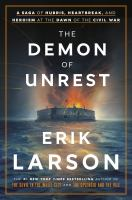 On November 6, 1860, Abraham Lincoln became the fluky victor in a tight race for president. The country was bitterly at odds; Southern extremists were moving ever closer to destroying the Union, with one state after another seceding and Lincoln powerless to stop them. Slavery fueled the conflict, but somehow the passions of North and South came to focus on a lonely federal fortress in Charleston Harbor: Fort Sumter.
On November 6, 1860, Abraham Lincoln became the fluky victor in a tight race for president. The country was bitterly at odds; Southern extremists were moving ever closer to destroying the Union, with one state after another seceding and Lincoln powerless to stop them. Slavery fueled the conflict, but somehow the passions of North and South came to focus on a lonely federal fortress in Charleston Harbor: Fort Sumter.
Master storyteller Erik Larson offers a gripping account of the chaotic months between Lincoln’s election and the Confederacy’s shelling of Sumter—a period marked by tragic errors and miscommunications, enflamed egos and craven ambitions, personal tragedies and betrayals. Lincoln himself wrote that the trials of these five months were “so great that, could I have anticipated them, I would not have believed it possible to survive them.”
At the heart of this suspense-filled narrative are Major Robert Anderson, Sumter’s commander and a former slave owner sympathetic to the South but loyal to the Union; Edmund Ruffin, a vain and bloodthirsty radical who stirs secessionist ardor at every opportunity; and Mary Boykin Chesnut, wife of a prominent planter, conflicted over both marriage and slavery and seeing parallels between them. In the middle of it all is the overwhelmed Lincoln, battling with his duplicitous secretary of state, William Seward, as he tries desperately to avert a war that he fears is inevitable—one that will eventually kill 750,000 Americans.
Drawing on diaries, secret communiques, slave ledgers, and plantation records, Larson gives us a political horror story that captures the forces that led America to the brink—a dark reminder that we often don’t see a cataclysm coming until it’s too late.
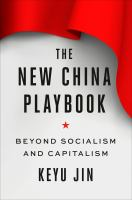 “China’s economy has been booming for decades now. Keyu Jin, an economist who was born in China and educated in the United States, brings her fluency in Eastern and Western cultures together to offer an explanation of how China became such a successful economic story. This book is a guide to the Chinese economy as it has shifted from being based primarily on state-owned enterprise to being based on entrepreneurship and participation in the global economy”–
“China’s economy has been booming for decades now. Keyu Jin, an economist who was born in China and educated in the United States, brings her fluency in Eastern and Western cultures together to offer an explanation of how China became such a successful economic story. This book is a guide to the Chinese economy as it has shifted from being based primarily on state-owned enterprise to being based on entrepreneurship and participation in the global economy”–
 Alexander von Humboldt (1769-1859) was an intrepid explorer and the most famous scientist of his age. His restless life was packed with adventure and discovery, whether climbing the highest volcanoes in the world or racing through anthrax-infested Siberia. He came up with a radical vision of nature, that it was a complex and interconnected global force and did not exist for man’s use alone. Ironically, his ideas have become so accepted and widespread that he has been nearly forgotten.
Alexander von Humboldt (1769-1859) was an intrepid explorer and the most famous scientist of his age. His restless life was packed with adventure and discovery, whether climbing the highest volcanoes in the world or racing through anthrax-infested Siberia. He came up with a radical vision of nature, that it was a complex and interconnected global force and did not exist for man’s use alone. Ironically, his ideas have become so accepted and widespread that he has been nearly forgotten.
Now Andrea Wulf brings the man and his achievements back into focus: his investigation of wild environments around the world; his discoveries of similarities between climate zones on different continents; his prediction of human-induced climate change; his remarkable ability to fashion poetic narrative out of scientific observation; and his relationships with iconic figures such as Simón Bolívar and Thomas Jefferson. Wulf examines how his writings inspired other naturalists and poets such as Wordsworth, Darwin, and Goethe, and she makes the compelling case that it was Humboldt’s influence on John Muir that led him to his ideas of preservation and that shaped Thoreau’s Walden.
Humboldt was the most interdisciplinary of scientists and is the forgotten father of environmentalism. With this brilliantly researched and compellingly written audiobook, she makes clear the myriad, fundamental ways that Humboldt created our understanding of the natural world.
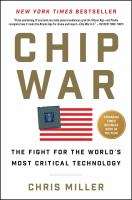 “An epic account of the decades-long battle to control what has emerged as the world’s most critical resource–microchip technology–with the United States and China increasingly in conflict. You may be surprised to learn that microchips are the new oil–the scarce resource on which the modern world depends. Today, military, economic, and geopolitical power are built on a foundation of computer chips. Virtually everything–from missiles to microwaves, smartphones to the stock market–runs on chips. Until recently, America designed and built the fastest chips and maintained its lead as the #1 superpower. Now, America’s edge is slipping, undermined by competitors in Taiwan, Korea, Europe, and, above all, China. Today, as Chip War reveals, China, which spends more money each year importing chips than it spends importing oil, is pouring billions into a chip-building initiative to catch up to the US. At stake is America’s military superiority and economic prosperity. Economic historian Chris Miller explains how the semiconductor came to play a critical role in modern life and how the U.S. become dominant in chip design and manufacturing and applied this technology to military systems. America’s victory in the Cold War and its global military dominance stems from its ability to harness computing power more effectively than any other power. But here, too, China is catching up, with its chip-building ambitions and military modernization going hand in hand. America has let key components of the chip-building process slip out of its grasp, contributing not only to a worldwide chip shortage but also a new Cold War with a superpower adversary that is desperate to bridge the gap. Illuminating, timely, and fascinating, Chip War shows that, to make sense of the current state of politics, economics, and technology, we must first understand the vital role played by chips”–Amazon.
“An epic account of the decades-long battle to control what has emerged as the world’s most critical resource–microchip technology–with the United States and China increasingly in conflict. You may be surprised to learn that microchips are the new oil–the scarce resource on which the modern world depends. Today, military, economic, and geopolitical power are built on a foundation of computer chips. Virtually everything–from missiles to microwaves, smartphones to the stock market–runs on chips. Until recently, America designed and built the fastest chips and maintained its lead as the #1 superpower. Now, America’s edge is slipping, undermined by competitors in Taiwan, Korea, Europe, and, above all, China. Today, as Chip War reveals, China, which spends more money each year importing chips than it spends importing oil, is pouring billions into a chip-building initiative to catch up to the US. At stake is America’s military superiority and economic prosperity. Economic historian Chris Miller explains how the semiconductor came to play a critical role in modern life and how the U.S. become dominant in chip design and manufacturing and applied this technology to military systems. America’s victory in the Cold War and its global military dominance stems from its ability to harness computing power more effectively than any other power. But here, too, China is catching up, with its chip-building ambitions and military modernization going hand in hand. America has let key components of the chip-building process slip out of its grasp, contributing not only to a worldwide chip shortage but also a new Cold War with a superpower adversary that is desperate to bridge the gap. Illuminating, timely, and fascinating, Chip War shows that, to make sense of the current state of politics, economics, and technology, we must first understand the vital role played by chips”–Amazon.
 A riveting, immersive account of the agonizing decision to use nuclear weapons against Japan–a crucial turning point in World War II and geopolitical history–with you-are-there immediacy by the New York Times bestselling author of Ike’s Bluff and Sea of Thunder.
A riveting, immersive account of the agonizing decision to use nuclear weapons against Japan–a crucial turning point in World War II and geopolitical history–with you-are-there immediacy by the New York Times bestselling author of Ike’s Bluff and Sea of Thunder.
At 9:20 a.m. on the morning of May 30, General Groves receives a message to report to the office of the secretary of war “at once.” Stimson is waiting for him. He wants to know: has Groves selected the targets yet?
So begins this suspenseful, impeccably researched history that draws on new access to diaries to tell the story of three men who were intimately involved with America’s decision to drop the atomic bomb–and Japan’s decision to surrender. They are Henry Stimson, the American Secretary of War, who had overall responsibility for decisions about the atom bomb; Gen. Carl “Tooey” Spaatz, head of strategic bombing in the Pacific, who supervised the planes that dropped the bombs; and Japanese Foreign Minister Shigenori Togo, the only one in Emperor Hirohito’s Supreme War Council who believed even before the bombs were dropped that Japan should surrender.
Henry Stimson had served in the administrations of five presidents, but as the U.S. nuclear program progressed, he found himself tasked with the unimaginable decision of determining whether to deploy the bomb. The new president, Harry S. Truman, thus far a peripheral figure in the momentous decision, accepted Stimson’s recommendation to drop the bomb. Army Air Force Commander Gen. Spaatz ordered the planes to take off. Like Stimson, Spaatz agonized over the command even as he recognized it would end the war. After the bombs were dropped, Foreign Minister Togo was finally able to convince the emperor to surrender.
To bring these critical events to vivid life, bestselling author Evan Thomas draws on the diaries of Stimson, Togo and Spaatz, contemplating the immense weight of their historic decision. In Road to Surrender, an immersive, surprising, moving account, Thomas lays out the behind-the-scenes thoughts, feelings, motivations, and decision-making of three people who changed history.
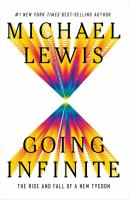 “When Michael Lewis first met him, Sam Bankman-Fried was the world’s youngest billionaire and crypto’s Gatsby. CEOs, celebrities, and leaders of small countries all vied for his time and cash after he catapulted, practically overnight, onto the Forbes billionaire list. Who was this rumpled guy in cargo shorts and limp white socks, whose eyes twitched across Zoom meetings as he played video games on the side? In Going Infinite Lewis sets out to answer this question, taking readers into the mind of Bankman-Fried, whose rise and fall offers an education in high-frequency trading, cryptocurrencies, philanthropy, bankruptcy, and the justice system. Both psychological portrait and financial roller-coaster ride, Going Infinite is Michael Lewis at the top of his game, tracing the mind-bending trajectory of a character who never liked the rules and was allowed to live by his own–until it all came undone”–
“When Michael Lewis first met him, Sam Bankman-Fried was the world’s youngest billionaire and crypto’s Gatsby. CEOs, celebrities, and leaders of small countries all vied for his time and cash after he catapulted, practically overnight, onto the Forbes billionaire list. Who was this rumpled guy in cargo shorts and limp white socks, whose eyes twitched across Zoom meetings as he played video games on the side? In Going Infinite Lewis sets out to answer this question, taking readers into the mind of Bankman-Fried, whose rise and fall offers an education in high-frequency trading, cryptocurrencies, philanthropy, bankruptcy, and the justice system. Both psychological portrait and financial roller-coaster ride, Going Infinite is Michael Lewis at the top of his game, tracing the mind-bending trajectory of a character who never liked the rules and was allowed to live by his own–until it all came undone”–
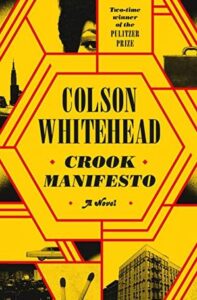 CROOK MANIFESTO
CROOK MANIFESTO
It’s not just crime fiction at its craftiest, but shrewdly rendered social history.
The adventures of entrepreneur, family man, and sometime fence Ray Carney, which began with Harlem Shuffle (2021), are carried from the Black Citadel’s harried-but-hopeful 1960s of that book to the dismal-and-divided ’70s shown here. In the first of three parts, it’s 1971, and Carney’s business is growing even amid the city’s Nixon-era doldrums and the rise of warring militant groups like the Black Panthers and the Black Liberation Army. Carney barely thinks about sliding back into his more illicit vocation until his teenage daughter, May, starts hankering to see the Jackson 5 perform at Madison Square Garden. And so he decides to look up an old contact named Munson, a seriously bent White NYPD officer and “accomplished fixer,” who agrees to get free “up close” seats for the concert if Carney will fence stolen jewelry stuffed in a paper bag. But the job carries far more physical peril than advertised, culminating in a long night’s journey into day with Carney getting beaten, robbed, and strong-armed into becoming Munson’s reluctant, mostly passive partner in the cop’s wanton rampage throughout the city. In the second part, it’s 1973, and Pepper, Carney’s strong, silent confidant and all-purpose tough guy, is recruited to work security on the set of a blaxploitation epic whose female lead inexplicably goes missing. The third and final part takes place in the bicentennial year of 1976, the nadir of the city’s fiscal crisis, marked by widespread fires in vacant buildings in Harlem and elsewhere in New York’s poorer neighborhoods. When an 11-year-old boy is seriously injured by a seemingly random firebombing, Carney is moved to ask himself, “What kind of man torches a building with people inside?” He resolves to find out with Pepper’s help. What recurs in each of these episodes are vivid depictions of hustlers of varied races and social strata, whether old-hand thieves, crass showbiz types, remorseless killers, or slick politicians on the make with the business elite. Whitehead’s gift for sudden, often grotesque eruptions of violence is omnipresent, so much so that you almost feel squeamish to recognize this book for the accomplished, streamlined, and darkly funny comedy of manners it is. If its spirits aren’t quite as buoyant as those of Harlem Shuffle, it’s because the era it chronicles was depressed in more ways than one. Assuming Whitehead continues chronicling Ray Carney’s life and times, things should perk up, or amp up, for the 1980s.
It’s not just crime fiction at its craftiest, but shrewdly rendered social history.
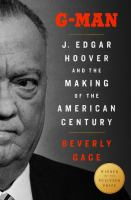 “A major new biography of J Edgar Hoover that draws from never-before-seen sources to create a groundbreaking portrait of a colossus who dominated half a century of American history and planted the seeds for much of today’s conservative political landscape. We remember him as a bulldog–squat frame, bulging wide-set eyes, fearsome jowls–but in 1924, when he became director of the FBI, he had been the trim, dazzling wunderkind of the administrative state, buzzing with energy and big ideas for reform. He transformed a failing law-enforcement backwater, riddled with scandal, into a modern machine. He believed in the power of the federal government to do great things for the nation and its citizens. He also believed that certain people–many of them communists or racial minorities or both–did not deserve to be included in that American project. Hoover rose to power and then stayed there, decade after decade, using the tools of state to create a personal fiefdom unrivaled in U.S. history. Beverly Gage’s monumental work explores the full sweep of Hoover’s life and career, from his birth in 1895 to a modest Washington civil-service family through his death in 1972. In her nuanced and definitive portrait, Gage shows how Hoover was more than a one-dimensional tyrant and schemer who strong-armed the rest of the country into submission. As FBI director from 1924 through his death in 1972, he was a confidant, counselor, and adversary to eight U.S. presidents, four Republicans and four Democrats. Franklin Roosevelt and Lyndon Johnson did the most to empower him, yet his closest friend among the eight was fellow anticommunist warrior Richard Nixon. Hoover was not above blackmail and intimidation, but he also embodied conservative values ranging from anticommunism to white supremacy to a crusading and politicized interpretation of Christianity. This garnered him the admiration of millions of Americans. He stayed in office for so long because many people, from the highest reaches of government down to the grassroots, wanted him there and supported what he was doing, thus creating the template that the political right has followed to transform its party. G-Man places Hoover back where he once stood in American political history–not at the fringes, but at the center–and uses his story to explain the trajectories of governance, policing, race, ideology, political culture, and federal power as they evolved over the course of the 20th century”–
“A major new biography of J Edgar Hoover that draws from never-before-seen sources to create a groundbreaking portrait of a colossus who dominated half a century of American history and planted the seeds for much of today’s conservative political landscape. We remember him as a bulldog–squat frame, bulging wide-set eyes, fearsome jowls–but in 1924, when he became director of the FBI, he had been the trim, dazzling wunderkind of the administrative state, buzzing with energy and big ideas for reform. He transformed a failing law-enforcement backwater, riddled with scandal, into a modern machine. He believed in the power of the federal government to do great things for the nation and its citizens. He also believed that certain people–many of them communists or racial minorities or both–did not deserve to be included in that American project. Hoover rose to power and then stayed there, decade after decade, using the tools of state to create a personal fiefdom unrivaled in U.S. history. Beverly Gage’s monumental work explores the full sweep of Hoover’s life and career, from his birth in 1895 to a modest Washington civil-service family through his death in 1972. In her nuanced and definitive portrait, Gage shows how Hoover was more than a one-dimensional tyrant and schemer who strong-armed the rest of the country into submission. As FBI director from 1924 through his death in 1972, he was a confidant, counselor, and adversary to eight U.S. presidents, four Republicans and four Democrats. Franklin Roosevelt and Lyndon Johnson did the most to empower him, yet his closest friend among the eight was fellow anticommunist warrior Richard Nixon. Hoover was not above blackmail and intimidation, but he also embodied conservative values ranging from anticommunism to white supremacy to a crusading and politicized interpretation of Christianity. This garnered him the admiration of millions of Americans. He stayed in office for so long because many people, from the highest reaches of government down to the grassroots, wanted him there and supported what he was doing, thus creating the template that the political right has followed to transform its party. G-Man places Hoover back where he once stood in American political history–not at the fringes, but at the center–and uses his story to explain the trajectories of governance, policing, race, ideology, political culture, and federal power as they evolved over the course of the 20th century”–
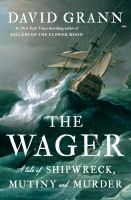 The author of Killers of the Flower Moon and The Lost City of Z returns with a rousing story of a maritime scandal.
The author of Killers of the Flower Moon and The Lost City of Z returns with a rousing story of a maritime scandal.
In 1741, the British vessel the Wager, pressed into service during England’s war with Spain, was shipwrecked in a storm off the coast of Patagonia while chasing a silver-laden Spanish galleon. Though initially part of a fleet, by the time of the shipwreck, the Wager stood alone, and many of its 250 crew members already had succumbed to injury, illness, starvation, or drowning. More than half survived the wreckage only to find themselves stranded on a desolate island. Drawing on a trove of firsthand accounts—logbooks, correspondence, diaries, court-martial testimony, and Admiralty and government records—Grann mounts a chilling, vibrant narrative of a grim maritime tragedy and its dramatic aftermath. Central to his populous cast of seamen are David Cheap, who, through a twist of fate, became captain of the Wager; Commodore George Anson, who had made Cheap his protégé; formidable gunner John Bulkeley; and midshipman John Byron, grandfather of the poet. Life onboard an 18th-century ship was perilous, as Grann amply shows. Threats included wild weather, enemy fire, scurvy and typhus, insurrection, and even mutiny. On the island, Cheap struggled to maintain authority as factions developed and violence erupted, until a group of survivors left—without Cheap—in rude makeshift boats. Of that group, 29 castaways later washed up on the coast of Brazil, where they spent more than two years in Spanish captivity; and three castaways, including Cheap, landed on the shores of Chile, where they, too, were held for years by the Spanish. Each group of survivors eventually returned to England, where they offered vastly different versions of what had occurred; most disturbingly, each accused the other of mutiny, a crime punishable by hanging. Recounting the tumultuous events in tense detail, Grann sets the Wager episode in the context of European imperialism as much as the wrath of the sea.
A brisk, absorbing history and a no-brainer for fans of the author’s suspenseful historical thrillers.

